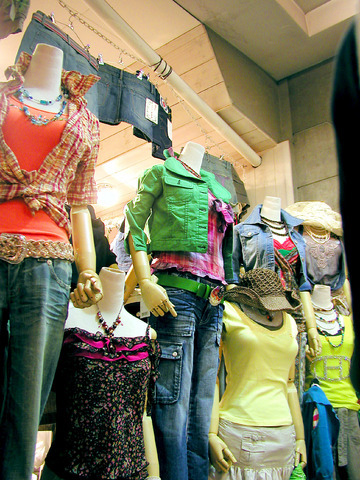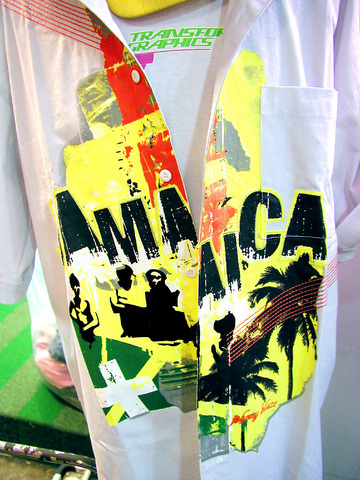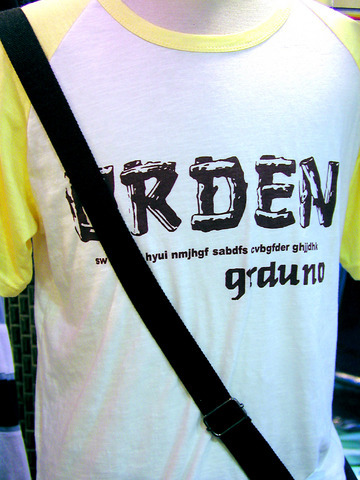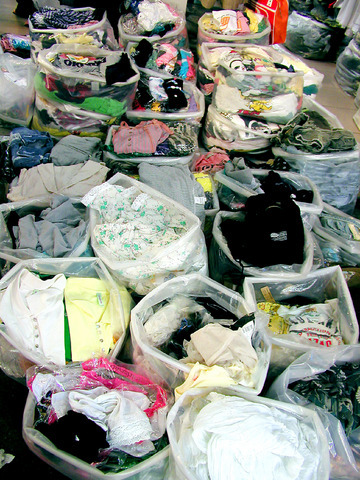The Wufenpu Garment Wholesale Area, as the popular clothing market opposite Taipei's Songshan train station is called, is a place that solves many of Taiwan's fashion mysteries in one fell swoop.
It's here in this semi-open-air market -- semi, because the goods spill out of the stores and onto the sidewalks and into the alleys -- where over 100 outlets supply a significant portion of the wardrobes favored by Taiwanese of all ages and fashion persuasions. And they do a brisk trade, with some stores selling by weight instead of item count, though single purchases of items are usually welcome.
Stores tend to specialize in specific fashion niches, such as trendy teeny-bopper gear, extra-large sizes, pet fashions, qipaos and pseudo-ethnic wear. Whatever their different specialties, they share a price range at the lowest end of the scale for clothes in Taipei.

PHOTO: MAX WOODWORTH, TAIPEI TIMES
"It's a race here to the bottom, price-wise," said one storeowner surnamed Chen (
Which is perhaps why Wufenpu has become a term that, when evoked in description of someone's fashion-sense, is intended to carry the sting of an accusation of poor taste and quality.
Popular actress Hsiao Shu-shen (

But despite the sneering aimed at the supposedly chintzy goods flooding out of Wufenpu, many people wandering the smart areas of Taipei are actually decked out in Wufenpu clothes and are making a fairly convincing show of having paid top dollar for their faux retro Mickey Mouse T-shirt or their sexy velour halter top. (Then again, some may have actually paid top dollar in East District boutiques for the clothes, but they would be suckers.)
It turns out that a lot of East District yuppies and hipsters, as well as teenagers mimicking pop star Jolin Tsai's (
But don't be fooled. The T-shirt with a Mary icon print and the words "Mary is my home girl" can be found at the market for about NT$200.

So before dropping a wad of cash for a DJ Guevara T-shirt or for an allegedly Nepalese skirt in front of the Dunhua South Road Eslite bookstore, savvy shoppers will make the trek to Wufenpu to pick them up for about NT$200 each.
Wufenpu is at its busiest on Mondays, as vendors from all parts of Taiwan come to stock up on goods that are later sold at night markets and stores. Using rapidly flashed hand signals, vendors haggle over prices for enormous bundles of clothes, which are then transported out of the narrow alleys behind scooters specially rigged with carts to the train station or to waiting courier trucks. From there, the clothes fan out around the city and the rest of Taiwan.
How the clothes reach Wufenpu, however, is a matter of considerable debate. The typical claim from vendors at the market for the provenance of their clothes is that they come from Hong Kong, Thailand and Japan. One vendor, however, confided that most of the products, in fact, were made in Taiwan.

Either way, the sheer volume of knock-off goods provides ample reason to question how forthright the stores are about their products. But judging from the number of customers, no one seems to dwell on the point.
The market fulfills a huge range of fashion demands for all ages and that's good enough for most. And with its low prices, the market guarantees that the winds of fashion can change quickly without leaving everyone in the dust.

Taiwan has next to no political engagement in Myanmar, either with the ruling military junta nor the dozens of armed groups who’ve in the last five years taken over around two-thirds of the nation’s territory in a sprawling, patchwork civil war. But early last month, the leader of one relatively minor Burmese revolutionary faction, General Nerdah Bomya, who is also an alleged war criminal, made a low key visit to Taipei, where he met with a member of President William Lai’s (賴清德) staff, a retired Taiwanese military official and several academics. “I feel like Taiwan is a good example of

March 2 to March 8 Gunfire rang out along the shore of the frontline island of Lieyu (烈嶼) on a foggy afternoon on March 7, 1987. By the time it was over, about 20 unarmed Vietnamese refugees — men, women, elderly and children — were dead. They were hastily buried, followed by decades of silence. Months later, opposition politicians and journalists tried to uncover what had happened, but conflicting accounts only deepened the confusion. One version suggested that government troops had mistakenly killed their own operatives attempting to return home from Vietnam. The military maintained that the

Jacques Poissant’s suffering stopped the day he asked his daughter if it would be “cowardly to ask to be helped to die.” The retired Canadian insurance adviser was 93, and “was wasting away” after a long battle with prostate cancer. “He no longer had any zest for life,” Josee Poissant said. Last year her mother made the same choice at 96 when she realized she would not be getting out of hospital. She died surrounded by her children and their partners listening to the music she loved. “She was at peace. She sang until she went to sleep.” Josee Poissant remembers it as a beautiful

Before the last section of the round-the-island railway was electrified, one old blue train still chugged back and forth between Pingtung County’s Fangliao (枋寮) and Taitung (台東) stations once a day. It was so slow, was so hot (it had no air conditioning) and covered such a short distance, that the low fare still failed to attract many riders. This relic of the past was finally retired when the South Link Line was fully electrified on Dec. 23, 2020. A wave of nostalgia surrounded the termination of the Ordinary Train service, as these train carriages had been in use for decades